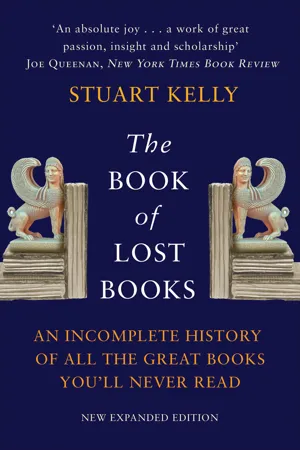
The Book of Lost Books
An Incomplete History of All the Great Books You'll Never Read
- 460 pages
- English
- ePUB (mobile friendly)
- Available on iOS & Android
About This Book
A " clever and highly entertaining" look at books through history that were stolen, went missing, or just never got written ( The New York Times ). In an age when deleted scenes from Adam Sandler movies are saved, it's sobering to realize that some of the world's great prose and poetry has gone missing. This witty and unique new book rectifies that wrong. Part detective story, part history, part exposé, The Book of Lost Books is the first guide to literature's what-ifs and never-weres. In compulsively readable fashion, this book reveals details about tantalizing vanished works by the famous, acclaimed, and influential, from the time of cave drawings to the late twentieth century. Here are true stories behind stories, poems, and plays that now exist only in imagination: ·Aristophanes' Heracles, the Stage Manager was one of the playwright's several spoofs that disappeared.
· Love's Labours Won may have been a sequel to Shakespeare's Love's Labours Lost —or was it just an alternative title for The Taming of the Shrew?
·Jane Austen's incomplete novel Sanditon was a critique of hypochondriacs and cures started when the author was fatally ill.
·Nikolai Gogol burned the second half of Dead Souls after a religious conversion convinced him that literature was paganism.
·Some of the thousand pages of William Burroughs's original Naked Lunch were stolen and sold on the street by Algerian street boys.
·Sylvia Plath's widower, Ted Hughes, claimed that the 130 pages of her second novel, perhaps based on their marriage, were lost after her death. Whether destroyed (Socrates' versions of Aesop's Fables ), misplaced (Malcolm Lowry's Ultramarine, pinched from his publisher's car), interrupted by the author's death (Robert Louis Stevenson's Weir of Hermiston ), or simply never begun (Vladimir Nabokov's Speak, America, a second volume of his memoirs), these missing links create a history of literature for a parallel world. Civilized, satirical, erudite yet accessible, The Book of Lost Books is a real find.
Frequently asked questions
Information
Index
Table of contents
- Cover
- About the Author
- Title page
- Copyright page
- Dedication page
- Contents
- Acknowledgements
- Introduction
- Anonymous
- Homer
- Hesiod
- The Yahwist, the Elohist, the Deuteronomist, the Priestly Author and the Redactor
- Sappho
- K’ung Fu-tzu
- Aeschylus
- Sophocles
- Euripides
- Agathon
- Aristophanes
- Xenocles and Others
- Menander
- Callimachus
- The Caesars
- Gallus
- Ovid
- Longinus
- Saint Paul (Saul of Tarsus)
- Origen
- Faltonia Betitia Proba
- Kālidāsa
- Fulgentius
- Widsith the Wide-travelled
- The Venerable Bede
- Muhammad Ibn Ishaq
- Ahmad ad-Daqiqi
- Dante Alighieri
- Geoffrey Chaucer
- François Villon
- John Skelton
- Camillo Querno
- Luis Vaz de Camões (Camoens)
- Torquato Tasso
- Miguel de Cervantes Saavedra
- Edmund Spenser
- William Shakespeare
- John Donne
- Ben Jonson
- John Milton
- Sir Thomas Urquhart
- Abraham Cowley
- Molière (Jean-Baptiste Poquelin)
- Jean Racine
- Ihara Saikaku
- Gottfried Wilhelm von Leibniz
- Alexander Pope
- Dr Samuel Johnson
- The Rev. Laurence Sterne
- Edward Gibbon
- Johann Wolfgang von Goethe
- Robert Fergusson
- James Hogg
- Sir Walter Scott
- Samuel Taylor Coleridge
- Jane Austen
- George Gordon, Lord Byron
- Thomas Carlyle
- Heinrich Heine
- Joseph Smith Jnr
- Nikolai Gogol
- Charles Dickens
- Herman Melville
- Gustave Flaubert
- Fyodor Dostoyevsky
- Sir Richard Burton
- Algernon Charles Swinburne
- Emile Zola
- Arthur Rimbaud
- Frank Norris
- Franz Kafka
- Ezra Loomis Pound
- Thomas Stearns Eliot
- Thomas Edward Lawrence
- Bruno Schulz
- Ernest Hemingway
- Dylan Marlais Thomas
- William S. Burroughs
- Robert Traill Spence Lowell IV
- Sylvia Plath
- Georges Perec
- Conclusion
- Another Introduction
- Hypereides
- Mani
- Gunādhya
- The Yongle Encyclopaedia
- The Makers
- Henslowe’s Diary
- Pierre de Fermat
- Emily Brontë
- Daniel Paul Schreber
- Philip K. Dick
- The Book of Lost Books
- Index